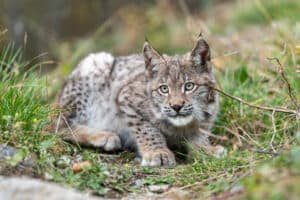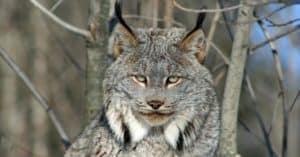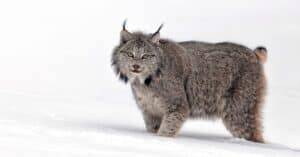Lynxes are medium-sized predatory cats that live in North America, Europe, and Asia. A young or juvenile lynx can resemble a domesticated cat. Yet, adult lynxes, especially the Eurasian lynx, grow far larger than any domestic cat while remaining smaller than many dogs. So, can lynx cats be pets? Take a closer look at the legal and practical factors that come into play when trying to keep one of these mammals as a pet.
How Big Do Lynx Get?
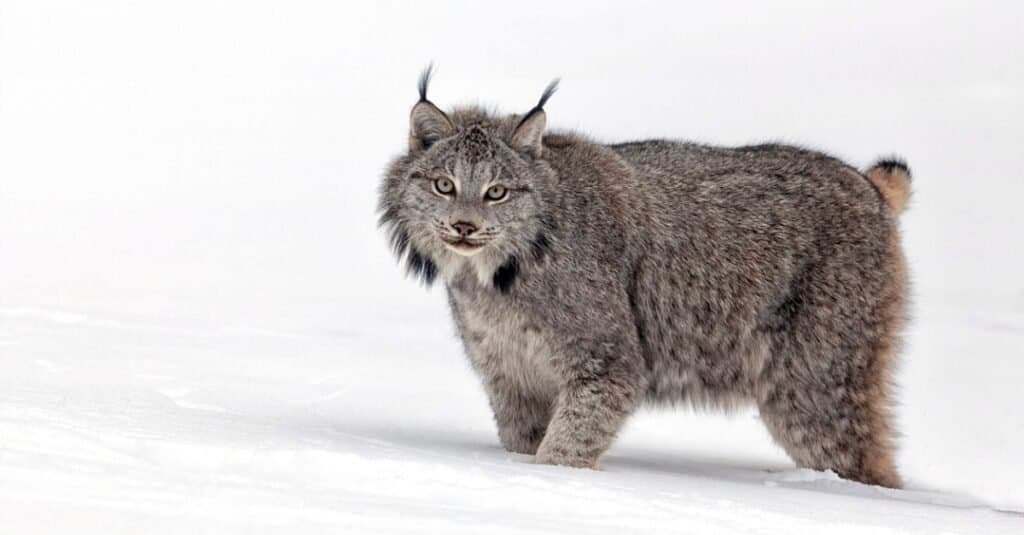
The largest lynxes can weigh over 60 pounds!
©iStock.com/Lynn_Bystrom
Before we look into whether or not lynx cats can be pets, it’s necessary to understand how large they can get. That way, it’s possible to see why people may think they would make good pets.
Four species of lynx exist in the world. The largest of those species is the Eurasian lynx. These creatures can weigh about 66 pounds, grow over 4 feet long, and stand about 2.5 feet at the shoulder. Granted, these are the largest measures of the biggest species. However, this size is far greater than any domestic cat.
Meanwhile, a golden retriever can weigh between 55 and 75 pounds, stands up to 2 feet tall at the shoulder, and measures about 3.5 to 4 feet long including their tails.
Given the similarity in size between a domestic dog and a lynx cat, some people may feel that they could handle one of these medium-sized wild cats. The truth is a little murkier, though.
Can You Keep Lynx Cats as Pets?
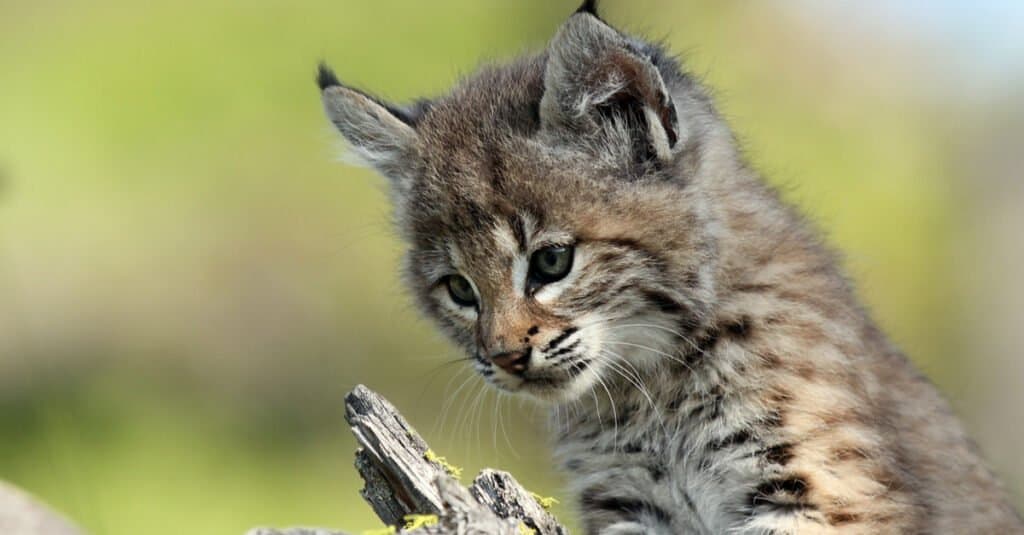
Young lynxes may be cute, but they grow up to become quite a dangerous animal.
©mlorenz/Shutterstock.com
Yes, you can keep lynx cats as pets in certain states in the U.S. and other countries where they’re found. However, just because someone can do something doesn’t necessarily mean it’s a good idea.
Generally speaking, two things prevent people from keeping an animal as a pet. One element is legality and the other is practicality. Some countries and states have placed limits on which animals people can keep as pets for safety and liability reasons. Some animals are also endangered and not allowed to be kept in the hands of the public to protect the population of those creatures.
The other element is the practicality of keeping a wild cat as a pet. That comes down to whether or not an individual can provide an enclosure for the pet, maintain its diet, and keep themselves and others safe from them.
The Legal Aspects of Keeping a Lynx as a Pet
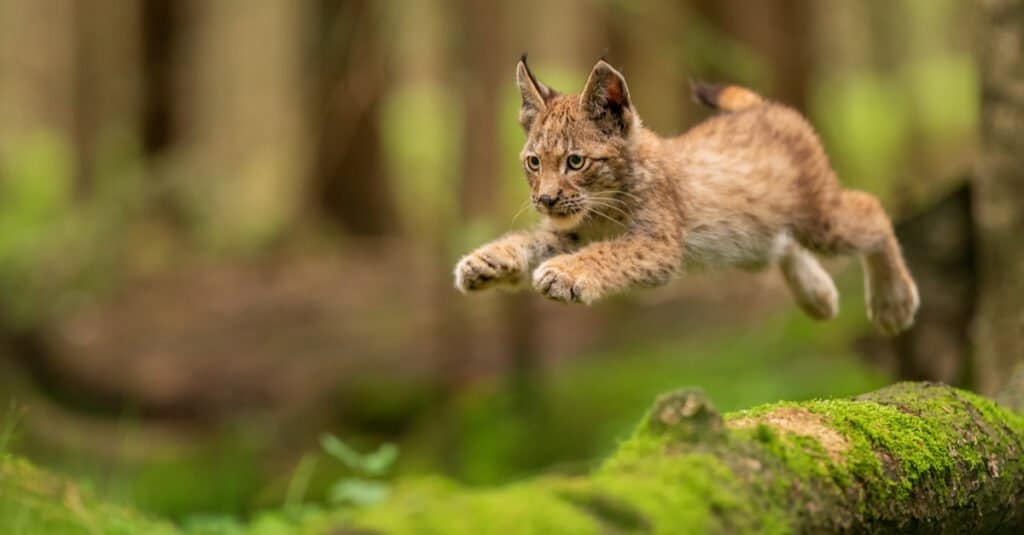
Not every country or state will allow a person to keep an exotic pet.
©Stanislav Duben/Shutterstock.com
Many places around the world will allow a person to keep a lynx as a pet. In that case, then yes, they can be pets. For example, several states either have provisions for people that want to keep these cats as pets or do not regulate the keeping of large animals.
Alabama, Delaware, Oklahoma, Nevada, North Carolina, and Wisconsin do not have any laws on the books to keep these large cats out of private hands. Meanwhile, 21 states in the United States ban all dangerous and exotic pets. The rest of the states have highly restrictive laws that allow for ownership in specific circumstances, and the animals may not be privately owned.
Thus, some people can legally own a lynx as a pet, but only in some circumstances. The laws in different places throughout the world are bound to vary. Considering that these mammals live throughout North America, Asia, and parts of Europe, millions of people could potentially own one.
However, the legal aspect of ownership is half of the issue. The other is the practicality of keeping a wild ambush predator as a pet.
The Practical Aspect of Owning a Wild Cat
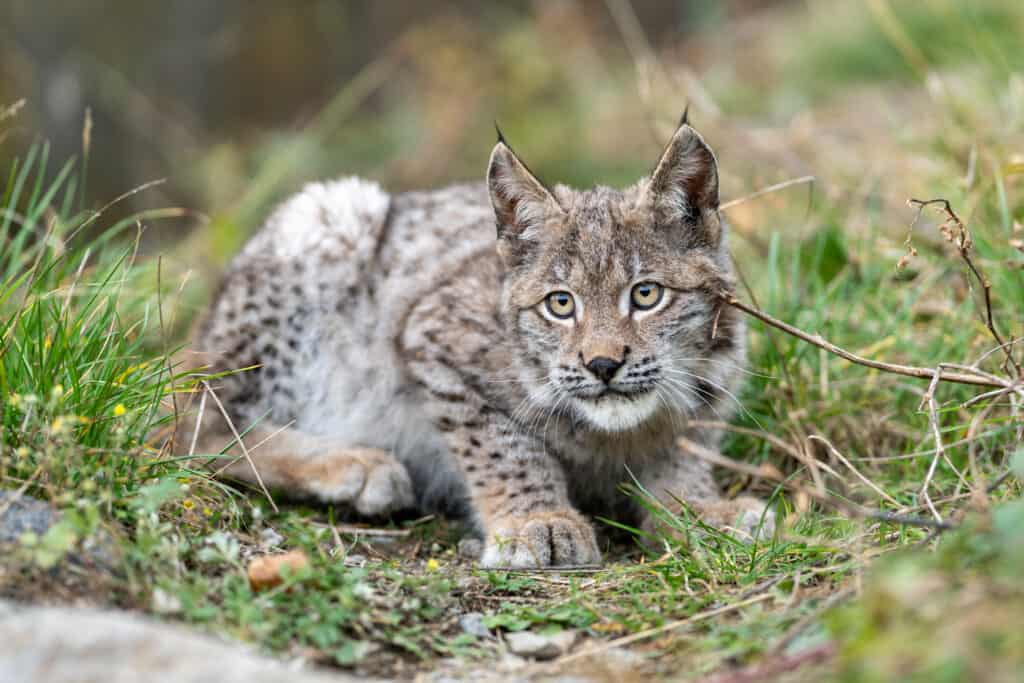
Although they’re not especially large, a lynx can still inflict serious wounds on people.
©Vaclav Sebek/Shutterstock.com
Having a lynx cat as a pet is nothing like having a domestic cat. These animals are not domesticated. Moreover, they lack the traits that will allow them to become calm, loving pets that enjoy or even tolerate the presence of a human being.
Presumably, some of these cats could accept being kept by humans in the same way that a lion does in the zoo. Yet, it would be dangerous and irresponsible to catch a wild lynx and try to make it into a pet. They could turn on humans and cause them serious harm.
Consider some of the practical reasons why owning a wild cat is not feasible.
Danger to the Owner
Practically speaking, a human can never be completely certain that they are safe around a pet lynx. While the same can be said for some dangerous dog breeds, these animals are not the least bit domesticated. They can attack humans that turn their back on them and inflict some serious wounds.
They would see other pets as prey, and they would certainly pose a significant threat to old people or children. In those cases, the lynxes could cause fatal injuries.
Lynx attacks on humans are rare. Part of the reason they are rare is that lynxes are stealthy hunters that avoid humans. In close proximity, these animals could act on their instincts and attack a person. That’s especially true if a person is not trained to be around these animals.
Meeting the Animal’s Dietary Needs
Lynxes are wild animals that require a special diet to continue living. It’s not as though a person can go to a pet food store and find a dry food mix that contains all the vitamins and nutrients needed to keep them healthy.
When they are kept in a zoo, lynxes are fed ground-meat, rib bones, rat, rabbit, and more to keep them nutritionally balanced. Aside from being costly, the meals are difficult to concoct for average people.
Can lynx cats be pets? Certainly, but it’s probably not a good idea for the vast majority of people. They are dangerous, wild animals that possibly can be tamed to an extent but never domesticated. The legality of owning these cats, the costs and efforts associated with their diets, and threats to human safety should all be considered before trying to obtain a lynx.
What Is the Easiest Big Cat to Tame?

A pet
cheetah
may be your best option…if you’re willing to move to a country where it’s legal to own one.
©Wayne Marinovich/Shutterstock.com
If you’re dead set on owning a wildcat, you may want to turn your attention to the Cheetah.
Believe it or not, Cheetahs have a history of being kept as exotic pets that go back 5,000 years. The first record of this was the ancient Sumerians, who captured, tamed, and trained 1,000 cheetahs. Some of these cats were trained to hunt, while others were taught to ride atop horses! Throughout history, they were kept as pets by emperors, pharaohs, and rulers, most notably Akbar, a 16th-century ruler in India, who owned 9,000 cheetahs over the course of a 49-year period. Cheetahs are currently kept as pets by some wealthy residents of the United Arab Emirates and assist hunters in some Middle East and African countries.
Cheetahs are considered the least dangerous of wild cats, and some are even allowed to interact with visitors at certain zoos. Cheetahs don’t see humans as prey, and even in the wild, they are selective of the type of foods they eat. They are not built to take down large prey the way lions and tigers are. So among exotic cat species, cheetahs were the most tameable.
Unfortunately, you’d need to move outside the U.S. to own a pet cheetah, as they are illegal in the United States. It’s also very difficult to import them, even for zoos. The only countries where cheetahs are openly (or illegally) bought, sold, and owned privately include the United Arab Emirates and certain countries in Asia and Africa.
The photo featured at the top of this post is © iStock.com/Kyslynskyy
Thank you for reading! Have some feedback for us? Contact the AZ Animals editorial team.



